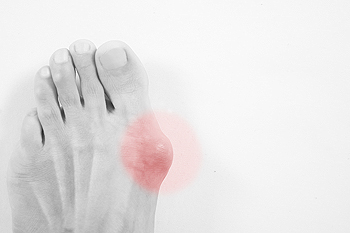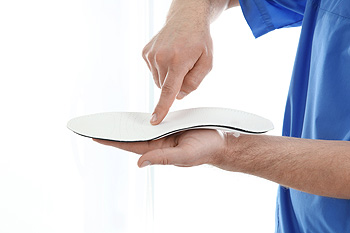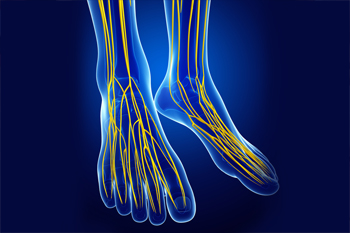Connect With Us
Blog
November 2019
 A common form of arthritis that is known as gout may be prevalent among men over the age of forty. This painful condition can be caused by genetic factors, or from eating foods that have elevated levels of purines. This may cause crystals to form in the joints, and often affects the big toe. These types of foods can include shellfish, alcohol, red meat, or drinks that have high sugar levels. The pain typically starts at night, and in severe attacks, anything that touches the affected area may be intolerable. This condition can be diagnosed by performing a joint aspiration. This technique involves extracting a small amount of fluid from the affected joint, followed by analyzing it for high levels of uric acid. There are specific medications that may be available for the treatment of gout. Additionally, these types of attacks may be prevented when healthy eating habits are implemented into your daily routine. If you are experiencing gout, it is suggested that you speak with a podiatrist who can guide you toward proper treatment options.
A common form of arthritis that is known as gout may be prevalent among men over the age of forty. This painful condition can be caused by genetic factors, or from eating foods that have elevated levels of purines. This may cause crystals to form in the joints, and often affects the big toe. These types of foods can include shellfish, alcohol, red meat, or drinks that have high sugar levels. The pain typically starts at night, and in severe attacks, anything that touches the affected area may be intolerable. This condition can be diagnosed by performing a joint aspiration. This technique involves extracting a small amount of fluid from the affected joint, followed by analyzing it for high levels of uric acid. There are specific medications that may be available for the treatment of gout. Additionally, these types of attacks may be prevented when healthy eating habits are implemented into your daily routine. If you are experiencing gout, it is suggested that you speak with a podiatrist who can guide you toward proper treatment options.
Gout is a painful condition that can be treated. If you are seeking treatment, contact one of our podiatrists from Canonsburg Podiatry Associates. Our doctors will treat your foot and ankle needs.
What Is Gout?
Gout is a form of arthritis that is characterized by sudden, severe attacks of pain, redness, and tenderness in the joints. The condition usually affects the joint at the base of the big toe. A gout attack can occur at any random time, such as the middle of the night while you are asleep.
Symptoms
- Intense Joint Pain - Usually around the large joint of your big toe, and it most severe within the first four to twelve hours
- Lingering Discomfort - Joint discomfort may last from a few days to a few weeks
- Inflammation and Redness -Affected joints may become swollen, tender, warm and red
- Limited Range of Motion - May experience a decrease in joint mobility
Risk Factors
- Genetics - If family members have gout, you’re more likely to have it
- Medications - Diuretic medications can raise uric acid levels
- Gender/Age - Gout is more common in men until the age of 60. It is believed that estrogen protects women until that point
- Diet - Eating red meat and shellfish increases your risk
- Alcohol - Having more than two alcoholic drinks per day increases your risk
- Obesity - Obese people are at a higher risk for gout
Prior to visiting your podiatrist to receive treatment for gout, there are a few things you should do beforehand. If you have gout you should write down your symptoms--including when they started and how often you experience them, important medical information you may have, and any questions you may have. Writing down these three things will help your podiatrist in assessing your specific situation so that he or she may provide the best route of treatment for you.
If you have any questions, please feel free to contact our office located in Canonsburg and McMurray, PA . We offer the newest diagnostic and treatment technologies for all your foot care needs.
 Many patients who experience specific foot conditions may benefit from wearing orthotics. They are defined as devices that are inserted into shoes, and are known to improve a variety of foot ailments. Research has indicated that there are three types of orthotics. First, there are inserts, which are created for certain foot conditions referred to as custom orthotics. Secondly, there are orthotics that are found in retail stores, and these may provide adequate support for mild foot ailments. A brace that can help to control ankle movement and may offer additional support to the foot is referred to as an ankle-foot orthotic. If you are interested in using orthotics to find relief from certain foot conditions, it is strongly advised that you seek the counsel of a podiatrist who can properly assist you.
Many patients who experience specific foot conditions may benefit from wearing orthotics. They are defined as devices that are inserted into shoes, and are known to improve a variety of foot ailments. Research has indicated that there are three types of orthotics. First, there are inserts, which are created for certain foot conditions referred to as custom orthotics. Secondly, there are orthotics that are found in retail stores, and these may provide adequate support for mild foot ailments. A brace that can help to control ankle movement and may offer additional support to the foot is referred to as an ankle-foot orthotic. If you are interested in using orthotics to find relief from certain foot conditions, it is strongly advised that you seek the counsel of a podiatrist who can properly assist you.
If you are having discomfort in your feet and would like to try orthotics, contact one of our podiatrists from Canonsburg Podiatry Associates. Our doctors can provide the care you need to keep you pain-free and on your feet.
What Are Orthotics?
Orthotics are inserts you can place into your shoes to help with a variety of foot problems such as flat feet or foot pain. Orthotics provide relief and comfort for minor foot and heel pain but can’t correct serious biomechanical problems in your feet.
Over-the-Counter Inserts
Orthotics come in a wide variety of over-the-counter inserts that are used to treat foot pain, heel pain, and minor problems. For example, arch supports can be inserted into your shoes to help correct overarched or flat feet, while gel insoles are often used because they provide comfort and relief from foot and heel pain by alleviating pressure.
Prescription Orthotics
If over-the-counter inserts don’t work for you or if you have a more severe foot concern, it is possible to have your podiatrist prescribe custom orthotics. These high-quality inserts are designed to treat problems such as abnormal motion, plantar fasciitis, and severe forms of heel pain. They can even be used to help patients suffering from diabetes by treating foot ulcers and painful calluses and are usually molded to your feet individually, which allows them to provide full support and comfort.
If you are experiencing minor to severe foot or heel pain, it’s recommended to speak with your podiatrist about the possibilities of using orthotics. A podiatrist can determine which type of orthotic is right for you and allow you to take the first steps towards being pain-free.
If you have any questions please contact our office located in Canonsburg and McMurray, PA . We offer the newest diagnostic and treatment technologies for all your foot and ankle needs.
 Patients who have had a stress fracture in the foot are often aware of the pain and discomfort it can typically cause. It can occur as a result of overuse from participating in sporting activities, or from standing for the majority of the day. Many people feel the pain after an activity is completed, and it may be difficult to walk. Additional reasons why this type of injury may occur can include changing footwear, increasing the intensity of training, or from running on different surfaces than what one is accustomed to. Relief may be felt when the affected foot is elevated, and the activity that caused the fracture is ceased. Stress fractures may be prevented when the feet are properly warmed up and stretched. If you feel you have endured a stress fracture, it is strongly advised that you schedule a consultation with a podiatrist who can properly treat this condition.
Patients who have had a stress fracture in the foot are often aware of the pain and discomfort it can typically cause. It can occur as a result of overuse from participating in sporting activities, or from standing for the majority of the day. Many people feel the pain after an activity is completed, and it may be difficult to walk. Additional reasons why this type of injury may occur can include changing footwear, increasing the intensity of training, or from running on different surfaces than what one is accustomed to. Relief may be felt when the affected foot is elevated, and the activity that caused the fracture is ceased. Stress fractures may be prevented when the feet are properly warmed up and stretched. If you feel you have endured a stress fracture, it is strongly advised that you schedule a consultation with a podiatrist who can properly treat this condition.
Stress fractures occur when there is a tiny crack within a bone. To learn more, contact one of our podiatrists from Canonsburg Podiatry Associates. Our doctors can provide the care you need to keep you pain free and on your feet.
How Are They Caused?
Stress fractures are the result of repetitive force being placed on the bone. Since the lower leg and feet often carry most of the body’s weight, stress fractures are likely to occur in these areas. If you rush into a new exercise, you are more likely to develop a stress fracture since you are starting too much, too soon. Pain resulting from stress fractures may go unnoticed at first, however it may start to worsen over time.
Risk Factors
- Gender – They are more commonly found in women compared to men.
- Foot Problems – People with unusual arches in their feet are more likely to develop stress fractures.
- Certain Sports – Dancers, gymnasts, tennis players, runners, and basketball players are more likely to develop stress fractures.
- Lack of Nutrients – A lack of vitamin D and calcium may weaken the bones and make you more prone to stress fractures
- Weak Bones – Osteoporosis can weaken the bones therefore resulting in stress fractures
Stress fractures do not always heal properly, so it is important that you seek help from a podiatrist if you suspect you may have one. Ignoring your stress fracture may cause it to worsen, and you may develop chronic pain as well as additional fractures.
If you have any questions, please feel free to contact our office located in Canonsburg and McMurray, PA . We offer the newest diagnostic and treatment technologies for all your foot care needs.
 Research has indicated that if you have poor circulation in your feet, it may be indicative of other medical conditions. These may include diabetes, heart conditions, and obesity. It is defined as restricted blood flow to the lower extremities, and there are often noticeable symptoms that are associated with this condition. These can consist of numbness, tingling, and muscle cramps, in addition to pain and discomfort. Nerve damage can possibly be caused by poor circulation, in addition to varicose veins and blood clots. Patients may find relief when specific exercises are performed, and compression stockings are worn that are designed for painful, swollen legs. If you feel you have symptoms of this condition, it is advised that you consult with a podiatrist to learn about the best treatment options for you.
Research has indicated that if you have poor circulation in your feet, it may be indicative of other medical conditions. These may include diabetes, heart conditions, and obesity. It is defined as restricted blood flow to the lower extremities, and there are often noticeable symptoms that are associated with this condition. These can consist of numbness, tingling, and muscle cramps, in addition to pain and discomfort. Nerve damage can possibly be caused by poor circulation, in addition to varicose veins and blood clots. Patients may find relief when specific exercises are performed, and compression stockings are worn that are designed for painful, swollen legs. If you feel you have symptoms of this condition, it is advised that you consult with a podiatrist to learn about the best treatment options for you.
While poor circulation itself isn’t a condition; it is a symptom of another underlying health condition you may have. If you have any concerns with poor circulation in your feet contact one of our podiatrists of Canonsburg Podiatry Associates. Our doctors will treat your foot and ankle needs.
Poor Circulation in the Feet
Peripheral artery disease (PAD) can potentially lead to poor circulation in the lower extremities. PAD is a condition that causes the blood vessels and arteries to narrow. In a linked condition called atherosclerosis, the arteries stiffen up due to a buildup of plaque in the arteries and blood vessels. These two conditions can cause a decrease in the amount of blood that flows to your extremities, therefore resulting in pain.
Symptoms
Some of the most common symptoms of poor circulation are:
- Numbness
- Tingling
- Throbbing or stinging pain in limbs
- Pain
- Muscle Cramps
Treatment for poor circulation often depends on the underlying condition that causes it. Methods for treatment may include insulin for diabetes, special exercise programs, surgery for varicose veins, or compression socks for swollen legs.
As always, see a podiatrist as he or she will assist in finding a regimen that suits you. A podiatrist can also prescribe you any needed medication.
If you have any questions, please feel free to contact our office located in Canonsburg and McMurray, PA . We offer the newest diagnostic and treatment technologies for all your foot care needs.
Blog Archives
- 2024
- 2023
- 2022
- 2021
- 2020
- 2019
- 2018
- 2017

